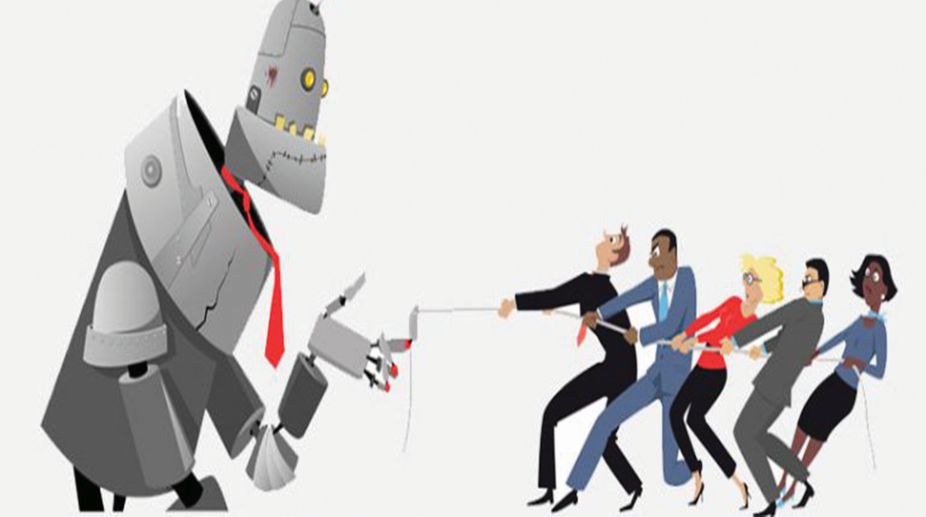A recent Price water house Cooper’s study of 200,000 jobs in 29 countries said evolving technology like automation and robotics could deliver good and bad news: predicted changes adding $US 15 trillion to global GDP, but also causing about 44 per cent of workers to lose their jobs within two decades.
India was not included in the PwC study released in February (probably due to the juicy reputation its accountants have in the country), with Japan, South Korea and Singapore being the only major Asian economies featured. PwC researchers estimated effects of three waves of automation in the next three decades.
Advertisement
But in an increasingly interconnected world, big shake-ups in one region will obviously have planetary ripple effects – particularly with India that is expected to be among the world’s leading economies by year 2050.
The PwC report ‘How automation will impact jobs?’ is the latest measurement of how life is changing since the Industrial Revolution, the computer and Internet revolution.
The unsettling upheavals, pain and progress of change is similar across centuries: corporate and media organisations might shudder at memories of ugly trade union resistance to computerisation of the 1990s – fears of machines replacing humans, and the jobless left running around in the streets. And then Internet-enabled computing machines and humans got along fine, just as the Industrial Revolution changed work for agricultural workers, not eliminating workers. Not unemployment but re-employment will be a focus in coming decades.
The three phases of automation in the next three decades, according to the PwC study, start with near-term changes like algorithms replacing workers in financial and investments sectors. Algorithmic share trading already causes havoc in rapid computerised buying and selling of shares at dizzying speed – giving human greed a dangerous technological boost in stock market speculation. Algorithmic trading will cause job losses not in the ways PwC expects, but through periodic financial scandals and subsequent global stock market crashes.
The transport sector could have huge job-loss in the third phase circa year 2035, declares the PwC study, when driverless vehicles take over roads. Overall, the less-educated among the workforce and women could be more severely affected in job losses from automation. “Governments and business need to work together to help people adjust to these new technologies through retraining and career changes”, recommend the PwC economists.
“A culture of adaptability and lifelong learning will be crucial for spreading the benefits of AI (artificial intelligence) and robotics widely through society…” Change is the only constant, and how we adapt to change defines how well we live our life. Changes can be unpleasant, but trying to dodge unpleasant truths is as futile as trying to dodge one’s shadow. Reality has to be faced, however much it means entering discomfort zones.
Compare our childhood years to year 2018, and we see how much life has changed within a lifetime: gone are neighbourhood book libraries that circulated Tintin and Asterix comics, adventures of the Five Find-outers, Billy Bunter and Biggles in holidays of childhood summers. Where are those once familiar faces of library owners now? Likewise videotape libraries that appeared and disappeared, music-recording (pirating) shops, audio cassettes, the big floppy discs of early personal computers, rotary-dial telephones… all once part of daily life, now gone but unmissed in their extinction.
With that expanding list – starting to include entries like wrist watches – went manufacturers, wholesalers, retailers; gone are thousands of jobs dependent on those business and products, like Fuji camera film gone with the wind in days of digital photography. But changes appear sudden only when failing to notice or ignore gradual transformation.
A long-term dip in demand for a particular format of delivery of service and product sounds warning bells of change, maybe extinction. Adaptability then becomes a key to excelling in a life in the never ending flow of impermanence. It first needs accepting the truth of change, and then changing one’s skills or mode of business. The ostrich-head-in-the-sand act of burying the mind to reality will never help.
Changes inevitably happen in all walks of life. When I started my professional journalism career, the poor sub-editor had to often key in hand-written copies on typewriters. Now possibly all leading print media houses have websites, news delivered on mobile phones. The age of online journalism needs digital evolution embracing multi-media and latest technologies. Water changes to ice, vapour or liquid according to temperature, and likewise gradual shifts of socio-economic circumstances compel quick adaptability.
Who knows how many everyday objects and services of 2018 will have vanished by year 2048? As the PwC study suggested, car drivers and even cars as we know them now might disappear – just as wooden-wheeled bullock carts often seen during boyhood summer holidays in my native village of Sergudi have vanished in the global village of the 21st century. That is why it is better to strive to excel in life, not merely survive; the pursuit of excellence ensures strength of mind, alertness to change. We get the safety margin to sail the perpetual tides of change, than being drowned to joblessness or extinction.
It depends on individual outlook to life: being negative to change, or welcoming it as happy evolution to a better world. If all our distant ancestors were not receptive to changes, we might still be lolling in caves and brandishing stone clubs in the hunt for lunch.
The writer is a senior, Mumbai-based journalist.











